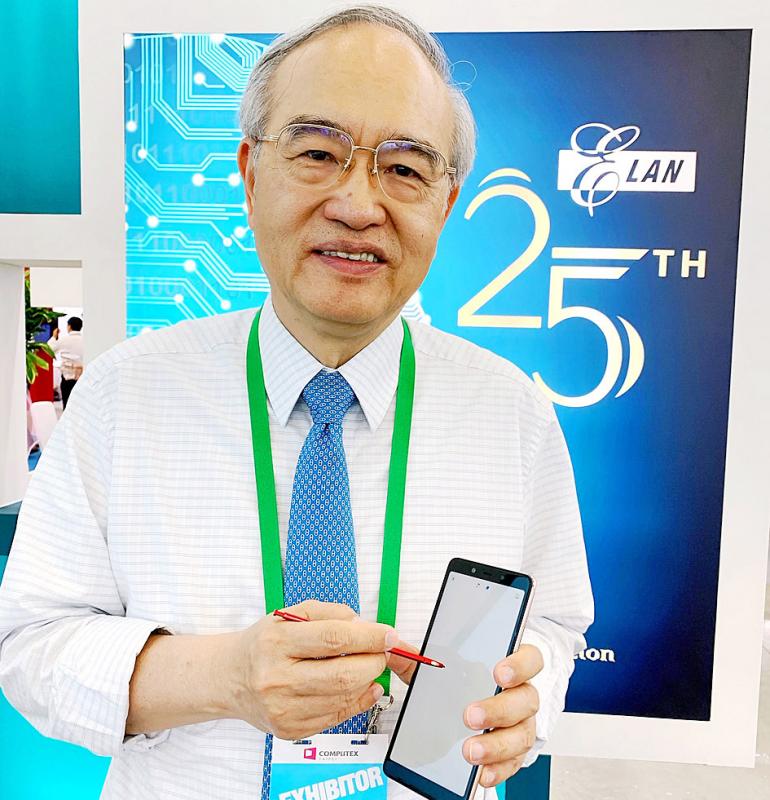Elan Microelectronics Corp (義隆電子) yesterday said its revenue would increase mildly this year, as limited availability of chips constrains its growth momentum.
Elan is the world’s biggest supplier of touchpad controllers primarily used in notebook computers.
The company said it is competing with automakers to secure chips made using less advanced process technologies, such as 40 nanometer and 55 nanometer, from foundry companies such as Taiwan Semiconductor Manufacturing Co (台積電) and United Microelectronics Co (聯電).

Photo: Vanessa Cho, Taipei Times
“The supply of fingerprint chips is particularly short,” Elan chairman Yeh I-hau (葉儀皓) told an online investors’ conference. “To secure more capacity, we started to make changes in [product design] to adapt to different process technologies. We hope to see some breakthrough in the second half of the year.”
Last year, Elan’s revenue jumped 21.4 percent to NT$18.33 billion (US$657.46 million) from NT$15.1 billion in 2020, benefiting from strong demand for notebook computers amid COVID-19-induced work from home and remote schooling trends.
Elan is optimistic about demand this year, as the launch of Microsoft Corp’s Windows 11 operating system in October last year would increase the number of replacement computers purchased, leading to robust demand for its touchpad controllers and fingerprint sensors, it said.
Windows 11 can also run Android apps, which would boost the penetration of touch screens, Yeh said.
Businesses are stepping up notebook computer replacement to adapt to remote working, he said.
Demand for commercial models is growing rapidly, offsetting sagging demand for lower-priced Chromebooks, which is a new growth area for Elan, he said.
“We started shipping touchpad [controllers] to Dell Inc this year,” Yeh said. “Our touchpad controllers used in commercial models have mostly been shipped to Lenovo (聯想) and HP.”
Lenovo is Elan’s biggest customer.
However, surging foundry prices have been eroding gross margin, Yeh said.
It is too early to tell whether a shortage of less advanced chips from 8-inch factories would alleviate significantly, given the scarcity of 8-inch manufacturing equipment, he said.
The issue would likely translate into a decline in gross margin this quarter, which is expected to be between 46.5 percent and 48.5 percent, compared with 49.4 percent last quarter, Elan said.
Revenue this quarter is expected to slide slightly to between NT$4 billion and NT$4.2 billion, from last quarter’s NT$4.16 billion, the company said, attributing the decline to fewer working days and seasonal weakness.
Net profit last quarter expanded about 11 percent to NT$1.31 billion, from NT$1.19 billion in the same period a year earlier. On a quarterly basis, net profit dipped 2.5 percent from NT$1.36 billion.
Last year as a whole, Elan’s net profit climbed to a record NT$5.1 billion, soaring about 57 percent from NT$3.25 billion in 2020.
That translated into earnings per share of NT$17.64, up from NT$11.14 in 2020.
Elan yesterday said its board of directors has approved a plan to distribute cash dividend of NT$13.5 per common share. That represents a payout ratio of 76.53 percent.

Intel Corp chief executive officer Lip-Bu Tan (陳立武) is expected to meet with Taiwanese suppliers next month in conjunction with the opening of the Computex Taipei trade show, supply chain sources said on Monday. The visit, the first for Tan to Taiwan since assuming his new post last month, would be aimed at enhancing Intel’s ties with suppliers in Taiwan as he attempts to help turn around the struggling US chipmaker, the sources said. Tan is to hold a banquet to celebrate Intel’s 40-year presence in Taiwan before Computex opens on May 20 and invite dozens of Taiwanese suppliers to exchange views

Application-specific integrated circuit designer Faraday Technology Corp (智原) yesterday said that although revenue this quarter would decline 30 percent from last quarter, it retained its full-year forecast of revenue growth of 100 percent. The company attributed the quarterly drop to a slowdown in customers’ production of chips using Faraday’s advanced packaging technology. The company is still confident about its revenue growth this year, given its strong “design-win” — or the projects it won to help customers design their chips, Faraday president Steve Wang (王國雍) told an online earnings conference. “The design-win this year is better than we expected. We believe we will win

Quanta Computer Inc (廣達) chairman Barry Lam (林百里) is expected to share his views about the artificial intelligence (AI) industry’s prospects during his speech at the company’s 37th anniversary ceremony, as AI servers have become a new growth engine for the equipment manufacturing service provider. Lam’s speech is much anticipated, as Quanta has risen as one of the world’s major AI server suppliers. The company reported a 30 percent year-on-year growth in consolidated revenue to NT$1.41 trillion (US$43.35 billion) last year, thanks to fast-growing demand for servers, especially those with AI capabilities. The company told investors in November last year that

Power supply and electronic components maker Delta Electronics Inc (台達電) yesterday said it plans to ship its new 1 megawatt charging systems for electric trucks and buses in the first half of next year at the earliest. The new charging piles, which deliver up to 1 megawatt of charging power, are designed for heavy-duty electric vehicles, and support a maximum current of 1,500 amperes and output of 1,250 volts, Delta said in a news release. “If everything goes smoothly, we could begin shipping those new charging systems as early as in the first half of next year,” a company official said. The new